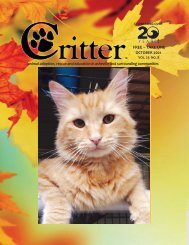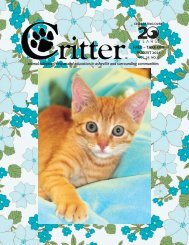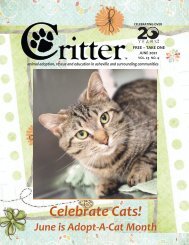You also want an ePaper? Increase the reach of your titles
YUMPU automatically turns print PDFs into web optimized ePapers that Google loves.
“The Bears Aren’t Mean,<br />
Just Hungry!”<br />
Although fall is almost here, it’s never too soon to plan a trip<br />
for next spring and summer. You might consider a road trip to<br />
enjoy the scenic beauty and wildlife in MN. The Vince Shute<br />
Wildlife Sanctuary (home of the non-profit American Bear<br />
Association) in Orr, MN might make for a very worthwhile<br />
experience—especially since we too, share our WNC<br />
mountains with these intelligent and amazing creatures. The<br />
information in this article was taken from their site at<br />
americanbear.org (as well as the title, which is credited to<br />
Vince Shute himself). Now closed for the season, they will<br />
re-open on Memorial Day 2022.<br />
Many years ago, a humble Minnesota logger made a<br />
decision that would greatly affect black bears and the<br />
attitudes people have towards this often-misunderstood<br />
animal. It was then that Vince Shute chose to stop<br />
shooting the bears that broke into his cabins. He tried a<br />
more peaceful approach and the strategy worked – no<br />
more break-ins. Vince claimed, “the bears aren’t mean,<br />
just hungry!” Thus, began Vince’s long and celebrated life<br />
with black bears in a tiny corner of the north woods near<br />
Orr, Minnesota.<br />
Generations of black bears still visit his former<br />
homestead, now designated as The Vince Shute Wildlife<br />
Sanctuary. The American Bear Association, a non-profit<br />
organization, was formed to manage the sanctuary in<br />
order to promote a better understanding of the black<br />
bear through education, observation and experience.<br />
Vince Shute’s final wish has become a reality – peaceful<br />
coexistence between humans and bears. All of the bears<br />
are free-roaming; they come and go at will through clover<br />
meadows, cool cedar swamps and pine forest.<br />
Far from solitary, simple-thinking, nuisances, black<br />
bears are highly intelligent creatures. Bears possess the<br />
largest and most convoluted brains relative to their size of<br />
any land mammal. Researchers theorize that they are<br />
actually more intelligent than chimpanzees. This is so,<br />
because chimps stay in the same territory their whole life,<br />
while black bears are constantly moving. Therefore, they<br />
constantly need to adapt and problem solve in their new<br />
environments.<br />
As highly social beings, black bears form complex<br />
social hierarchies and can remember familiar animals for<br />
years, recognizing and identifying them from a distance<br />
as far as 2,000 feet away. As omnivores, black bears<br />
are significantly more intelligent than more specialized<br />
feeders. This is so, because their varied diet means that<br />
bears have to remember a lot of information about a wide<br />
variety of food resources. Incredibly, black bears compile<br />
a detailed map of their environment and can remember<br />
where they encountered a certain food source from ten or<br />
more years earlier.<br />
Bears have something called a vomeronasal organ,<br />
more commonly known as the Jacobson’s organ. This<br />
organ is located on the roof of the mouth and connects<br />
directly to the nasal cavity. The Jacobson organ aids<br />
bears in smelling, and storing various scents. Male bears<br />
will use their Jacobson’s organ to capture the pheromone<br />
scent of a female in estrus during mating season. Mother<br />
bears will chew up food and hold open their mouths for<br />
their cubs to recognize a safe food source. The cubs will<br />
use their Jacobson’s organ in order to store that scent. In<br />
order to use this organ, bears will lift their head after<br />
finding the scent, and use a facial movement called the<br />
flehmen response, which helps direct the scent into the<br />
organ. The flehmen response includes the bear wrinkling<br />
its nose while curling its lips back.<br />
At the Vince Shute Wildlife Sanctuary, we see<br />
extensive signs of critical thinking. Bears will often use<br />
half-rotten logs as floats to get across rivers and streams.<br />
As shown in the photo below, bears often use logs as<br />
bridges.<br />
Amazingly, black bears can make long term plans. For<br />
instance, bears will climb to the top of oak trees in midsummer<br />
to assess the budding crop of acorns, as if to try to<br />
determine how much food they will have come fall time.<br />
Bears will also start searching for a den to hibernate in as<br />
early as June-July. The incredible resourcefulness and<br />
problem-solving abilities of black bears is what often times<br />
gets them into trouble with humans. Bears have figured out<br />
a plethora of ways to benefit from living in close proximity<br />
with us. A bear could spend all day foraging for berries, or<br />
get ten times that amount of protein, fat, and calories from<br />
a Big Mac in your garbage. As such, living in bear country<br />
requires a willingness to minimize bear attractants, as well<br />
as a tolerance and appreciation of these incredible beings.<br />
For more information about black bears and the<br />
sanctuary, visit americanbear.org. Also on Facebook at<br />
Vince Shute Wildlife Sanctuary. For helpful tips about<br />
precautions for local bears, see Bear Wise Basics on p. 24.<br />
PLEASE BE SURE YOUR PET HAS A<br />
MICROCHIP AND ALWAYS WEARS AN<br />
ID TAG WITH CURRENT INFORMATION!<br />
CRITTER MAGAZINE • SEPTEMBER 2021 • PAGE 9
















